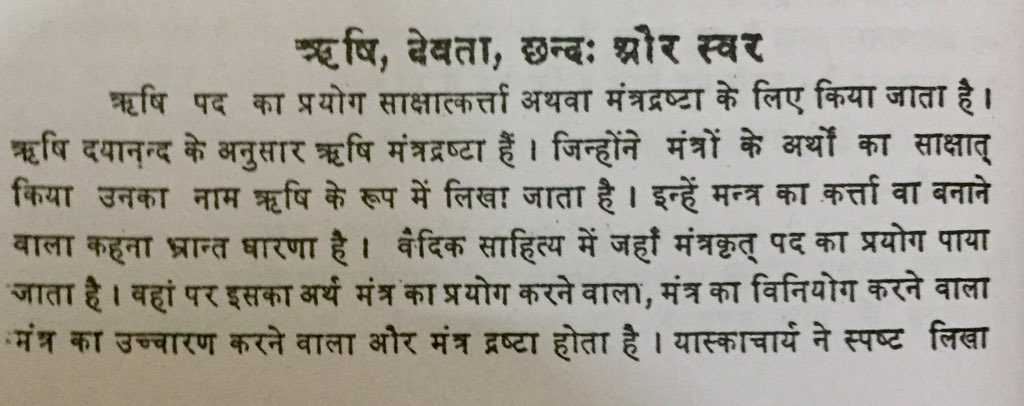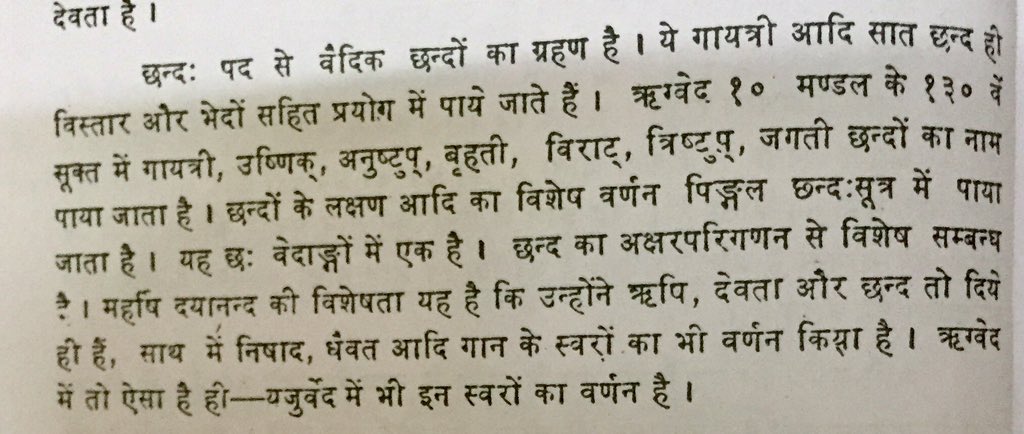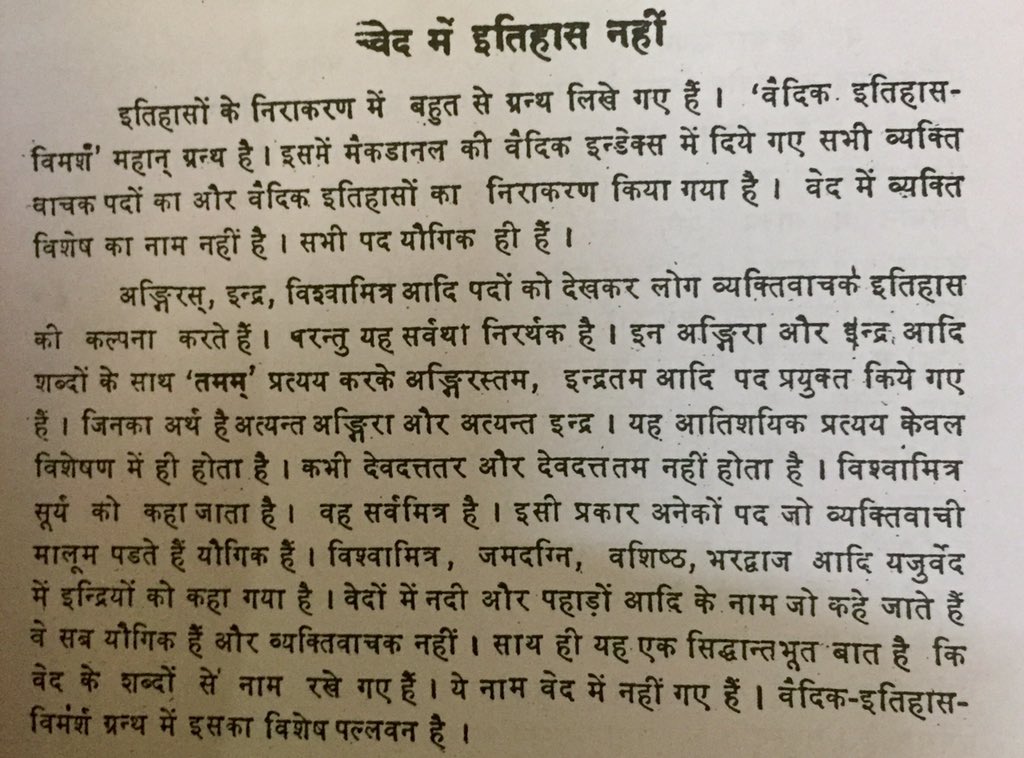#Thread on Vedas (mainly samhitas) with translations and commentary by Maharshi Dayanand Saraswati and other Vedic scholars in Hindi. #SanatanaDharma #vedas #scriptures #Hinduism #hindu #knowledge #sacred #divine
@AartiAuthor @harshasherni @SRaEarth09 @Mahender_Chem @visa_pro @Shiv_Sharwani11 @Dharma_View @Itishree001 @MsStilettoes @VedicWisdom1 @VaruKrutika @dhingramahima9 @skepticalbeing0 @SanhitaTiwari @VertigoWarrior @VipashaRanjan @arjit2000 @vedicvishal @shradhasumanrai  https://abs.twimg.com/emoji/v2/... draggable="false" alt="👇" title="Rückhand Zeigefinger nach unten" aria-label="Emoji: Rückhand Zeigefinger nach unten">
https://abs.twimg.com/emoji/v2/... draggable="false" alt="👇" title="Rückhand Zeigefinger nach unten" aria-label="Emoji: Rückhand Zeigefinger nach unten">
Source and Credit :
1)Rig Veda, Yajur Veda, Sam Veda and Atharveda by Arya Prakahsan.
2) http://www.vedicheritage.gov.in/introduction/ ">https://www.vedicheritage.gov.in/introduct... for an introductory overview on Vedas.
1)Rig Veda, Yajur Veda, Sam Veda and Atharveda by Arya Prakahsan.
2) http://www.vedicheritage.gov.in/introduction/ ">https://www.vedicheritage.gov.in/introduct... for an introductory overview on Vedas.
Quoting Maharishi Dayanand Saraswati, on Vedas :-
“Vedas are the source of all the true knowledge. Studying, teaching, listening and propagating of Vedas are the foremost Dharma of every Arya (noble) person.” https://abs.twimg.com/emoji/v2/... draggable="false" alt="👇" title="Rückhand Zeigefinger nach unten" aria-label="Emoji: Rückhand Zeigefinger nach unten">
https://abs.twimg.com/emoji/v2/... draggable="false" alt="👇" title="Rückhand Zeigefinger nach unten" aria-label="Emoji: Rückhand Zeigefinger nach unten">
“Vedas are the source of all the true knowledge. Studying, teaching, listening and propagating of Vedas are the foremost Dharma of every Arya (noble) person.”
Arya here refers to all the noble followers of Sanatan Dharma who uphold their Dharma against all the odds of time and society.
Before we dive into this eternal ocean of knowledge in Sanatan Dharma called Vedas (derived from Sanskrit root word ‘vid’), let’s understand what exactly it is as briefly as possible, though it often takes lifetime to comprehend and inculcate the entire learning from the Vedas.
Vedas or Vedic knowledge is the greatest inspiration for any soul to achieve highest level of nobility and turn towards true Divine devotion. Vedas are regarded as the words directly from the omnipotent, omniscient and omnipresent, most merciful, generous AUM (Ishwar).  https://abs.twimg.com/emoji/v2/... draggable="false" alt="👇" title="Rückhand Zeigefinger nach unten" aria-label="Emoji: Rückhand Zeigefinger nach unten">
https://abs.twimg.com/emoji/v2/... draggable="false" alt="👇" title="Rückhand Zeigefinger nach unten" aria-label="Emoji: Rückhand Zeigefinger nach unten">
Vedas, being the most revered srutis of all, encompasses highest spiritual, sacred, divine, as well as scientific knowledge for the benefit of the entire mankind. It is meant to propel a soul to the optimum state of Dharma, Kama, Artha and Moksha... https://abs.twimg.com/emoji/v2/... draggable="false" alt="👇" title="Rückhand Zeigefinger nach unten" aria-label="Emoji: Rückhand Zeigefinger nach unten">
https://abs.twimg.com/emoji/v2/... draggable="false" alt="👇" title="Rückhand Zeigefinger nach unten" aria-label="Emoji: Rückhand Zeigefinger nach unten">
.. It expounds the nitty-gritty of the infinite inter-relationships between Ishwar (God/Deity), Jeev (Living beings) and Prakriti (Nature). https://abs.twimg.com/emoji/v2/... draggable="false" alt="👇" title="Rückhand Zeigefinger nach unten" aria-label="Emoji: Rückhand Zeigefinger nach unten">
https://abs.twimg.com/emoji/v2/... draggable="false" alt="👇" title="Rückhand Zeigefinger nach unten" aria-label="Emoji: Rückhand Zeigefinger nach unten">
Thus, Vedas are infinite, eternal source of knowledge, from the very source of all the Divinity in the world. Nevertheless, it is the most authoritative knowledge & as emphasised by Swami Dayananda Saraswati also, Vedas are the last tribunal in matters of dispute, https://abs.twimg.com/emoji/v2/... draggable="false" alt="👇" title="Rückhand Zeigefinger nach unten" aria-label="Emoji: Rückhand Zeigefinger nach unten">...
https://abs.twimg.com/emoji/v2/... draggable="false" alt="👇" title="Rückhand Zeigefinger nach unten" aria-label="Emoji: Rückhand Zeigefinger nach unten">...
... be it religion, philosophy or social customs in Hindu society. Those who believe on Vedas are regarded ‘Astika’, while who don’t are considered ‘Nastikas’.
Vedas are categorised broadly into Rig, Yajur, Sam and Atharva, each containing a particular facet of divine wisdom and knowledge....
.... Each of this Veda comprises of four different classes of Vedic literature- Samhitas (mantras & benedictions), Brahmanas (commentaries on rituals, sacrifices, ceremonies etc.), Aranyakas (texts on rituals, symbolic & non symbolic sacrifices, ceremonies etc.) and..
.... Upanishads (texts on meditation, philosophy and spirituality). Most of these Vedic literature are lost in time. However, many of them have survived to the present times unadulterated.
Let’s keep in mind that as claimed by many traditionalists, Vedas are neither mere religious texts, nor contain only mantras for rituals and fire sacrifices alone.
Rig Veda is the treasure house of science, knowledge and wisdom. Rig Veda is divided into 10 mandals consisting of around 10,552 verses across 1028 hymns (suktas).
This is what the book by Arya Prakashan has to say about Rig Veda  https://abs.twimg.com/emoji/v2/... draggable="false" alt="👇" title="Rückhand Zeigefinger nach unten" aria-label="Emoji: Rückhand Zeigefinger nach unten">
https://abs.twimg.com/emoji/v2/... draggable="false" alt="👇" title="Rückhand Zeigefinger nach unten" aria-label="Emoji: Rückhand Zeigefinger nach unten">
Yajur Veda contains hymns & ways for worshipping Ishwar through rites & rituals,using physical material (Dhatu).It also deals with science of art, music, skill & physical properties, needed for well-being of the human society. There are 1,975 verses of Yajurved in 40 chapters. https://abs.twimg.com/emoji/v2/... draggable="false" alt="👇" title="Rückhand Zeigefinger nach unten" aria-label="Emoji: Rückhand Zeigefinger nach unten">
https://abs.twimg.com/emoji/v2/... draggable="false" alt="👇" title="Rückhand Zeigefinger nach unten" aria-label="Emoji: Rückhand Zeigefinger nach unten">
Sam Veda is also regarded as the Veda for Worship or Veneration (Upasana) of the Almighty. There are 1,875 verses of Samved divided in 21 chapters...
Atharveda is regarded as the treasure house of knowledge and wisdom. This Veda deals with the hymns to explore & venerate Almighty in every matter in the Universe Which has roots in the word Atharvan. Hence, it is called Atharveda. There are 5,977 verses divided into 20 chapters.
While studying Vedas, one may find terminologies like Devta, Rishi, Chanda and Swara, before the start of any hymn (Sukta). Let’s try to understand what does this mean exactly. They do have deeper meanings but here we will try to learn a brief meaning of them.
Many of us confuse Devta assigned to a particular Sukta with some God in Vedas. However, it does not exactly mean so....
.. Devta broadly refers to the subject matter reflecting in that particular Sukta. Later, Gods of such qualities as explained in the Sukta were named accordingly and venerated in the Hindu society. https://abs.twimg.com/emoji/v2/... draggable="false" alt="👇" title="Rückhand Zeigefinger nach unten" aria-label="Emoji: Rückhand Zeigefinger nach unten">
https://abs.twimg.com/emoji/v2/... draggable="false" alt="👇" title="Rückhand Zeigefinger nach unten" aria-label="Emoji: Rückhand Zeigefinger nach unten">
Coming to Rishi. It is a misunderstanding that a Rishi name assigned to a Sukta refers to certain sage who drafted that Sukta. Rishi names used in the Vedas are all common nouns, each corresponding to certain set of qualities, virtues and properties narrated in various suktas....
...In later times, several male and female sages, who expertised, researched and expounded on different suktas , adopted those Rishi and Rishika names from Vedas and became popular as great, respectable Vedic scholars.
Chhanda is one of the 6 limbs of Vedas, called Vedangas, which deal with Sanskrit prosody or in simple words, the way suktas should follow the patterns of rhythm and sounds while being chanted. There are several Chhanda in Rig Veda such as Gayatri, Bruhati, Virat, Anustup etc.
Svara or swara is a Sanskrit word that connotes a note in the successive steps of the octave. In simpler words, it is the ancient Indian concept about the complete dimension of musical pitch...
.. In Vedas, the basic swaras used for chanting are udatta, anudatta and svarita, each referring to a particular pattern of chanting respective suktas.
Before concluding this brief introduction on Vedas, let’s keep in mind that Vedas Doesn’t Contain History, as believed and opined by many modern day experts.
All person names, rivers and places etc appearing in Vedas,...
All person names, rivers and places etc appearing in Vedas,...
.... just like Rishis & Rishikas, describe qualities, virtues and properties of different personalities (Male or female), geographical entities and locations etc as common nouns...
... Subsequently, such Vedic names were adopted by legendary men and women like Lopamudra, Gargi, Ghosha, Vispala (warrior queen who fought with a prosthetic limb) etc....
... who by virtue of their exceptional achievements in their respective spheres got their names recorded in golden words in our timeless history.
As we navigate through the various mantras (verses), suktas(hymns) and mandalas (books/sections) of the Vedas, we will experience the significance of our timeless ancient Vedic wisdom and their application in our present day lives.... https://abs.twimg.com/emoji/v2/... draggable="false" alt="👇" title="Rückhand Zeigefinger nach unten" aria-label="Emoji: Rückhand Zeigefinger nach unten">
https://abs.twimg.com/emoji/v2/... draggable="false" alt="👇" title="Rückhand Zeigefinger nach unten" aria-label="Emoji: Rückhand Zeigefinger nach unten">
... We will nevertheless also envisage its utility, as we struggle to bring in spirituality in our modern hectic lives.
I will make threads on 6 types of Vedangas and Upvedas separately, which are considered limbs and derivatives of core Vedic knowledge, respectively.
Besides above, I plan to append links to several #threads in tweeter below  https://abs.twimg.com/emoji/v2/... draggable="false" alt="👇" title="Rückhand Zeigefinger nach unten" aria-label="Emoji: Rückhand Zeigefinger nach unten">dedicated to several suktas and mantras in Vedas, starting with Rig Veda, the treasure house of eternal and supreme knowledge and wisdom.
https://abs.twimg.com/emoji/v2/... draggable="false" alt="👇" title="Rückhand Zeigefinger nach unten" aria-label="Emoji: Rückhand Zeigefinger nach unten">dedicated to several suktas and mantras in Vedas, starting with Rig Veda, the treasure house of eternal and supreme knowledge and wisdom.

 Read on Twitter
Read on Twitter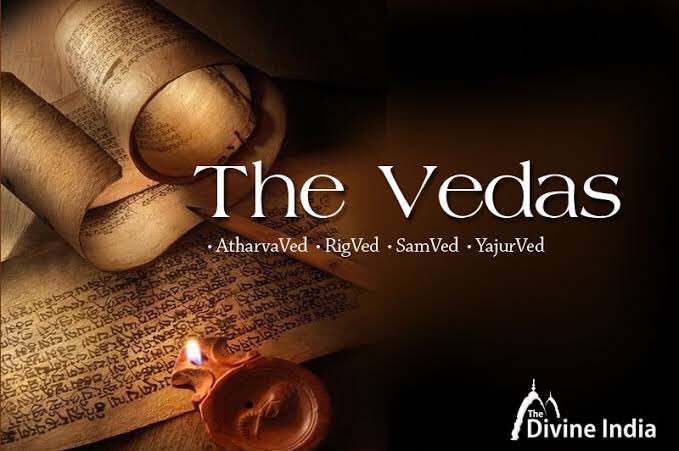
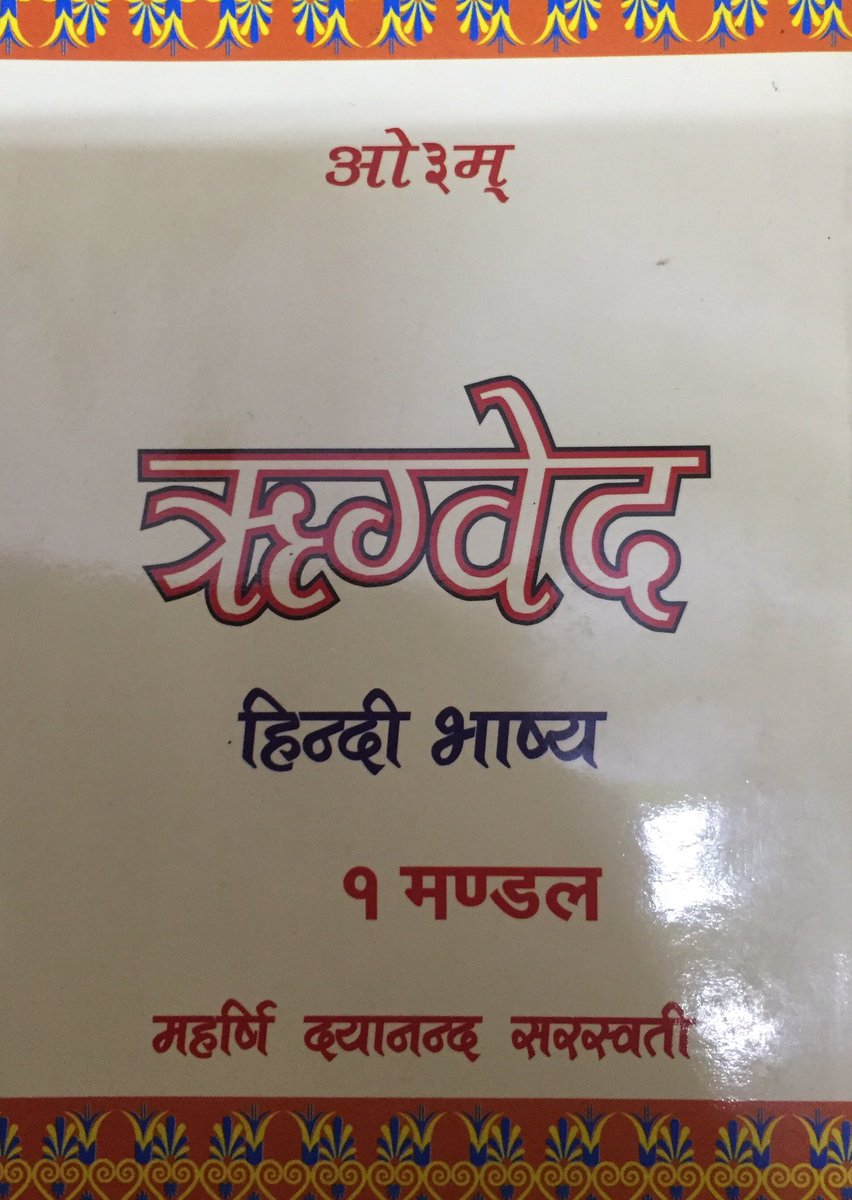
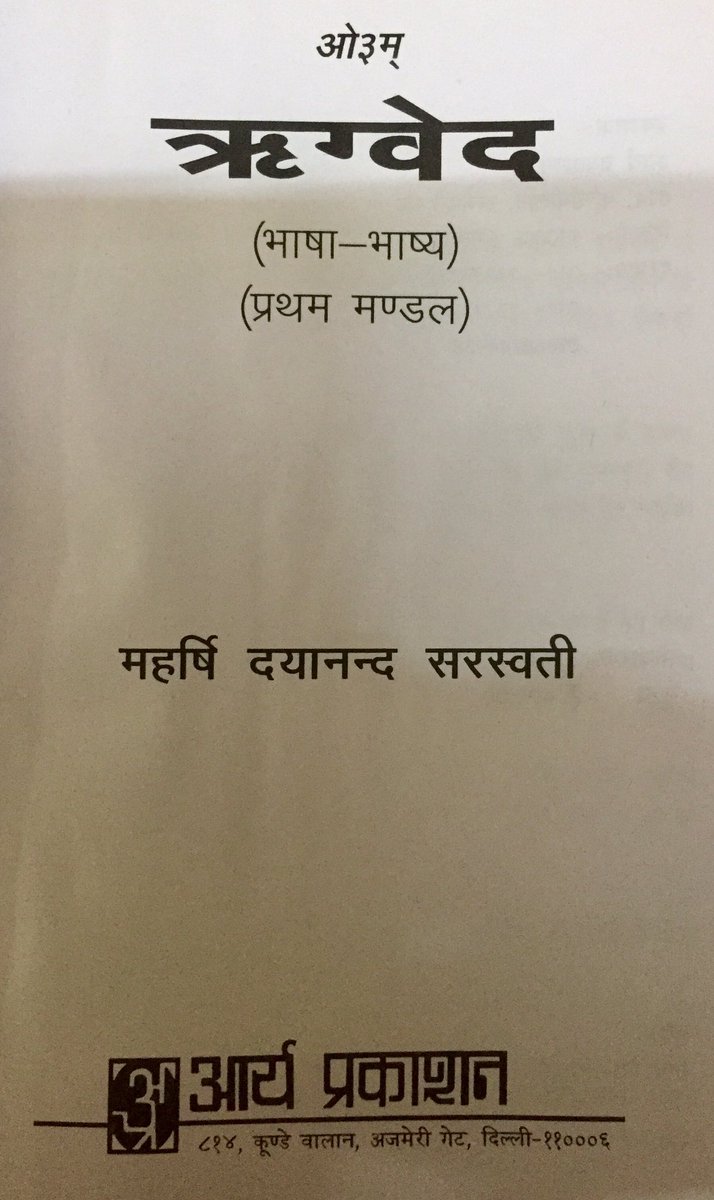
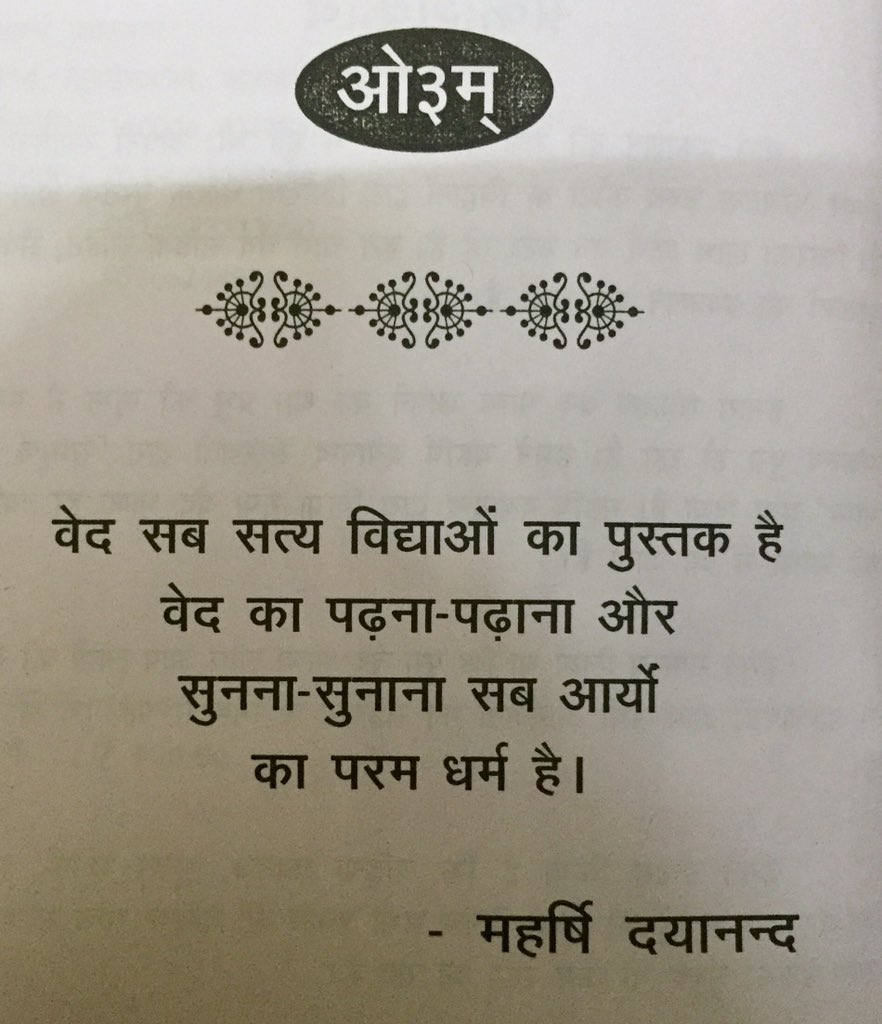 " title="Quoting Maharishi Dayanand Saraswati, on Vedas :-“Vedas are the source of all the true knowledge. Studying, teaching, listening and propagating of Vedas are the foremost Dharma of every Arya (noble) person.” https://abs.twimg.com/emoji/v2/... draggable="false" alt="👇" title="Rückhand Zeigefinger nach unten" aria-label="Emoji: Rückhand Zeigefinger nach unten">" class="img-responsive" style="max-width:100%;"/>
" title="Quoting Maharishi Dayanand Saraswati, on Vedas :-“Vedas are the source of all the true knowledge. Studying, teaching, listening and propagating of Vedas are the foremost Dharma of every Arya (noble) person.” https://abs.twimg.com/emoji/v2/... draggable="false" alt="👇" title="Rückhand Zeigefinger nach unten" aria-label="Emoji: Rückhand Zeigefinger nach unten">" class="img-responsive" style="max-width:100%;"/>
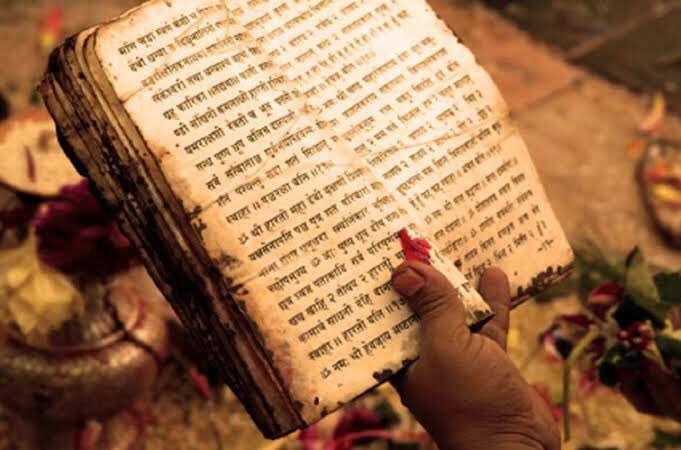
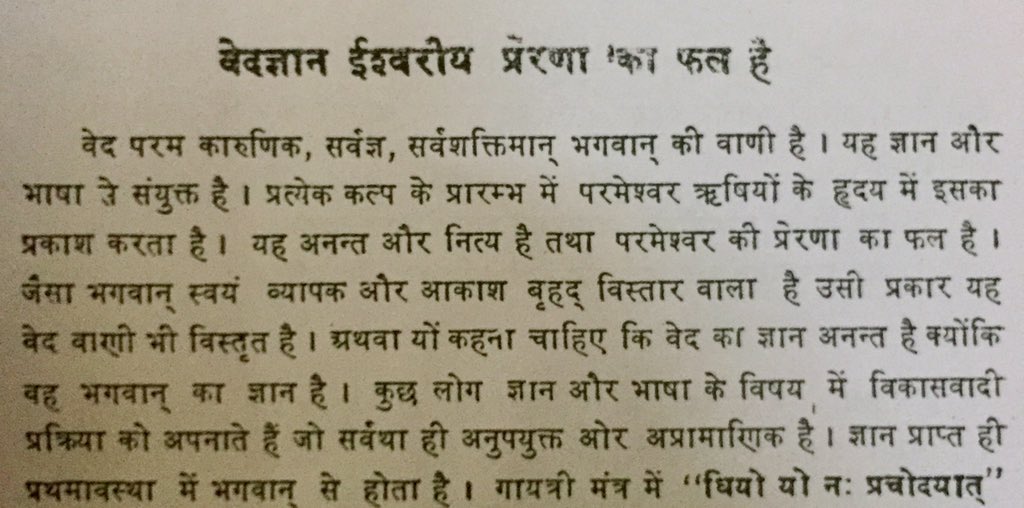 " title="Vedas or Vedic knowledge is the greatest inspiration for any soul to achieve highest level of nobility and turn towards true Divine devotion. Vedas are regarded as the words directly from the omnipotent, omniscient and omnipresent, most merciful, generous AUM (Ishwar). https://abs.twimg.com/emoji/v2/... draggable="false" alt="👇" title="Rückhand Zeigefinger nach unten" aria-label="Emoji: Rückhand Zeigefinger nach unten">" class="img-responsive" style="max-width:100%;"/>
" title="Vedas or Vedic knowledge is the greatest inspiration for any soul to achieve highest level of nobility and turn towards true Divine devotion. Vedas are regarded as the words directly from the omnipotent, omniscient and omnipresent, most merciful, generous AUM (Ishwar). https://abs.twimg.com/emoji/v2/... draggable="false" alt="👇" title="Rückhand Zeigefinger nach unten" aria-label="Emoji: Rückhand Zeigefinger nach unten">" class="img-responsive" style="max-width:100%;"/>
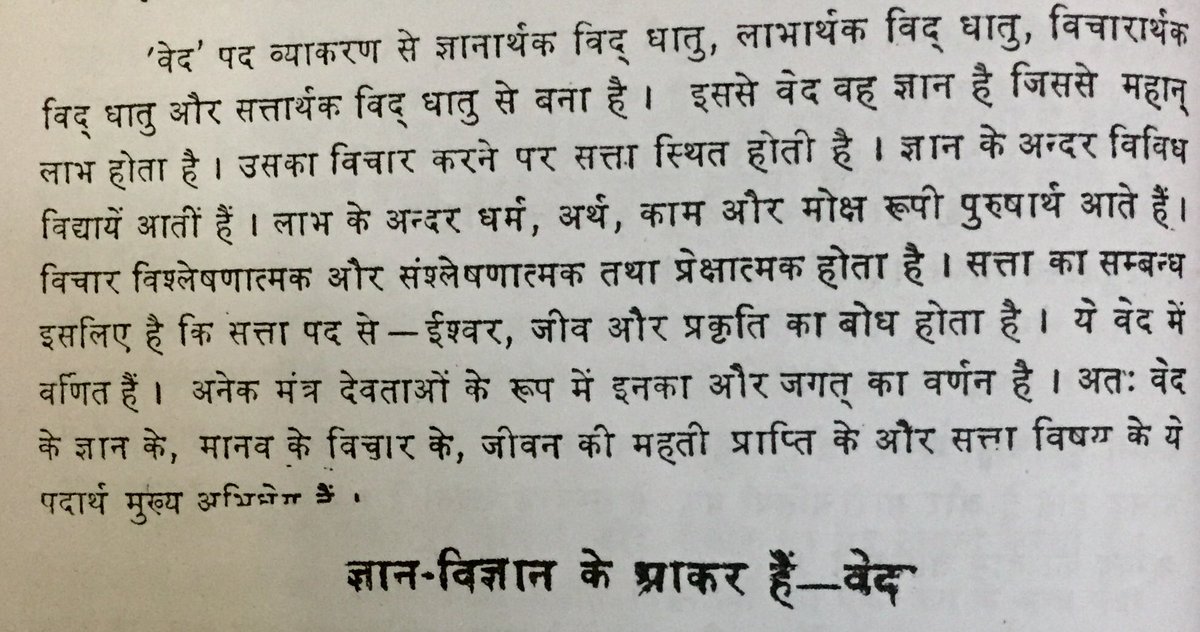 " title=".. It expounds the nitty-gritty of the infinite inter-relationships between Ishwar (God/Deity), Jeev (Living beings) and Prakriti (Nature).https://abs.twimg.com/emoji/v2/... draggable="false" alt="👇" title="Rückhand Zeigefinger nach unten" aria-label="Emoji: Rückhand Zeigefinger nach unten">" class="img-responsive" style="max-width:100%;"/>
" title=".. It expounds the nitty-gritty of the infinite inter-relationships between Ishwar (God/Deity), Jeev (Living beings) and Prakriti (Nature).https://abs.twimg.com/emoji/v2/... draggable="false" alt="👇" title="Rückhand Zeigefinger nach unten" aria-label="Emoji: Rückhand Zeigefinger nach unten">" class="img-responsive" style="max-width:100%;"/>

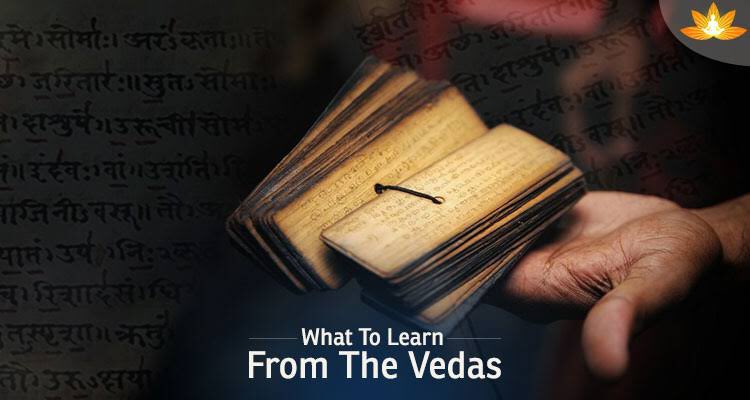
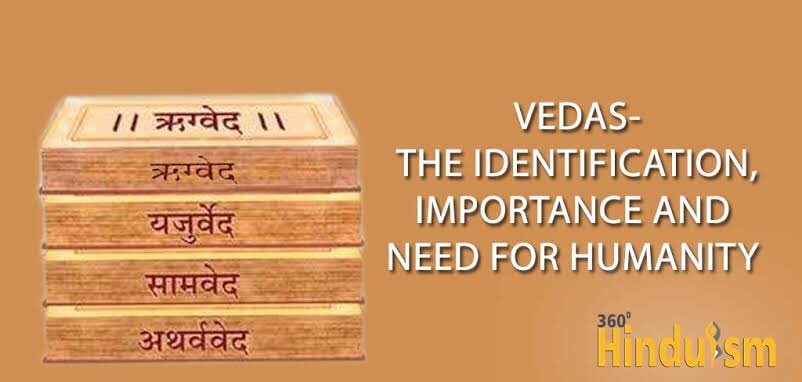
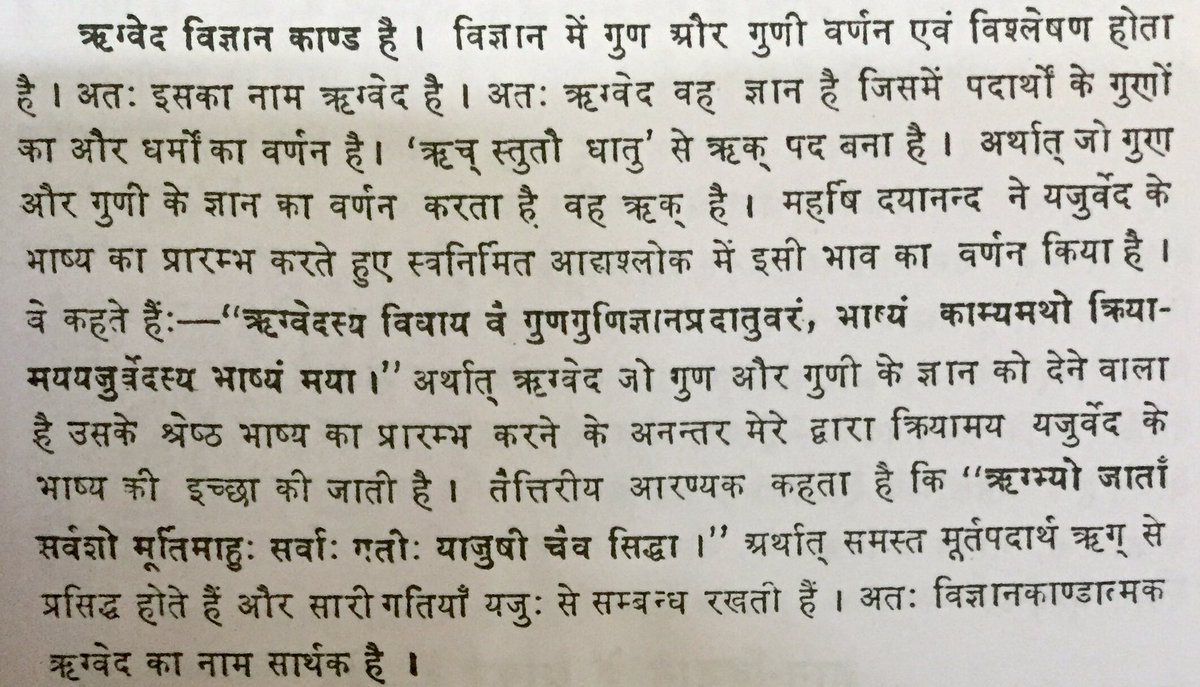 " title="This is what the book by Arya Prakashan has to say about Rig Veda https://abs.twimg.com/emoji/v2/... draggable="false" alt="👇" title="Rückhand Zeigefinger nach unten" aria-label="Emoji: Rückhand Zeigefinger nach unten">" class="img-responsive" style="max-width:100%;"/>
" title="This is what the book by Arya Prakashan has to say about Rig Veda https://abs.twimg.com/emoji/v2/... draggable="false" alt="👇" title="Rückhand Zeigefinger nach unten" aria-label="Emoji: Rückhand Zeigefinger nach unten">" class="img-responsive" style="max-width:100%;"/>
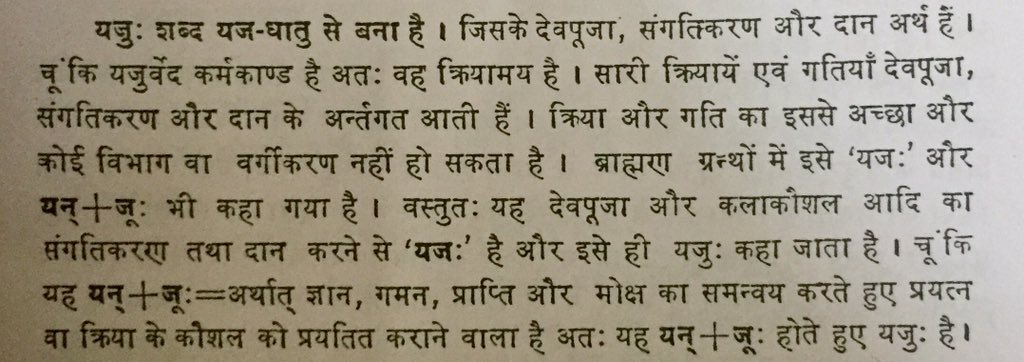 " title="Yajur Veda contains hymns & ways for worshipping Ishwar through rites & rituals,using physical material (Dhatu).It also deals with science of art, music, skill & physical properties, needed for well-being of the human society. There are 1,975 verses of Yajurved in 40 chapters.https://abs.twimg.com/emoji/v2/... draggable="false" alt="👇" title="Rückhand Zeigefinger nach unten" aria-label="Emoji: Rückhand Zeigefinger nach unten">" class="img-responsive" style="max-width:100%;"/>
" title="Yajur Veda contains hymns & ways for worshipping Ishwar through rites & rituals,using physical material (Dhatu).It also deals with science of art, music, skill & physical properties, needed for well-being of the human society. There are 1,975 verses of Yajurved in 40 chapters.https://abs.twimg.com/emoji/v2/... draggable="false" alt="👇" title="Rückhand Zeigefinger nach unten" aria-label="Emoji: Rückhand Zeigefinger nach unten">" class="img-responsive" style="max-width:100%;"/>


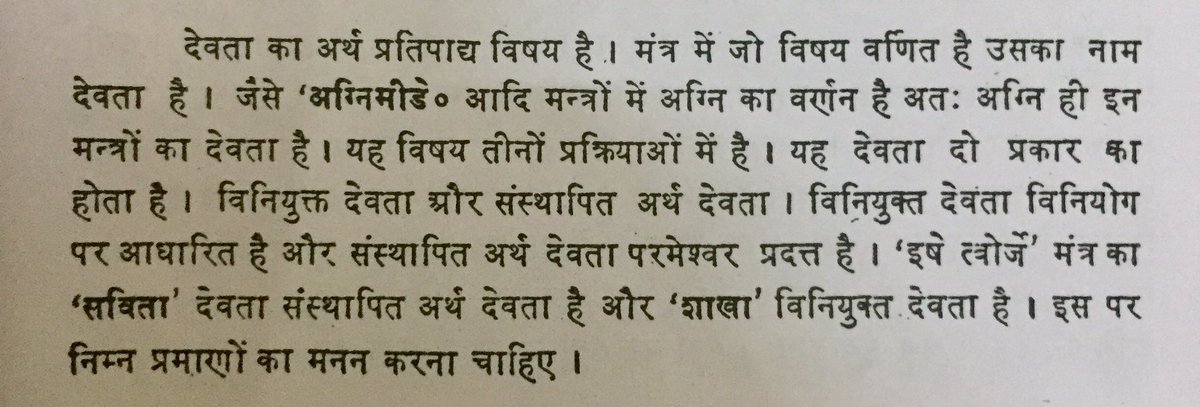 " title=".. Devta broadly refers to the subject matter reflecting in that particular Sukta. Later, Gods of such qualities as explained in the Sukta were named accordingly and venerated in the Hindu society.https://abs.twimg.com/emoji/v2/... draggable="false" alt="👇" title="Rückhand Zeigefinger nach unten" aria-label="Emoji: Rückhand Zeigefinger nach unten">" class="img-responsive" style="max-width:100%;"/>
" title=".. Devta broadly refers to the subject matter reflecting in that particular Sukta. Later, Gods of such qualities as explained in the Sukta were named accordingly and venerated in the Hindu society.https://abs.twimg.com/emoji/v2/... draggable="false" alt="👇" title="Rückhand Zeigefinger nach unten" aria-label="Emoji: Rückhand Zeigefinger nach unten">" class="img-responsive" style="max-width:100%;"/>
